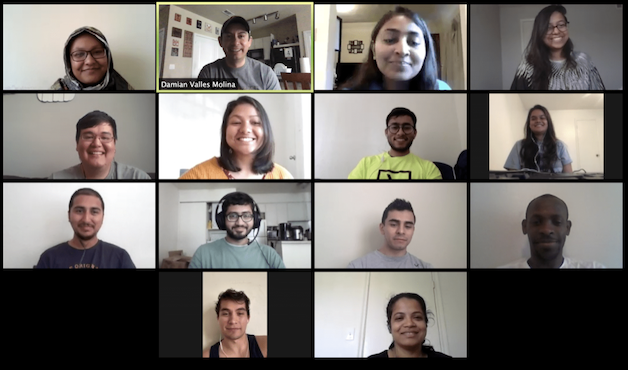Engineering students support research remotely and adapt to remote learning
Julie Cooper | May 4, 2020

Texas State electrical engineering students in the High-Performance Engineering (HiPE) research group – like university students everywhere – have felt the impact of the coronavirus pandemic. In some ways, learning and conducting research remotely has brought some improvements, but along with it, added stress.
Dr. Damian Valles, assistant professor Electrical & Computer Engineering and HiPE Research group director, oversees 12 students working on research projects. The list of research projects underway is varied and inspiring. (Explore a complete list of their projects here).
HiPE is the university’s High-Performance Engineering research group. Its mission is to develop and innovate engineering solutions utilizing High-Performance Computing (HPC) tools, Machine Learning (ML) techniques, embedded solutions and digital designs to relevant computational research components for STEM, healthcare, and other research fields. Most of Valles’ students are interested in machine learning and are collaborating with different departments on projects.
On the Monday that Valles was interviewed, he was working on a grant for the fire safety project. This project develops autonomous, self-navigating cars to go into burning buildings to detect victims, detect temperature and carbon monoxide levels, map the floors and aid in rescue operations – all without sending a firefighter into the building.
Another project involves a machine learning model to recognize emotions for children on the Autism Spectrum. Valles explained that the model uses facial expression, emotion, speech, and body gesture recognition. The group is working with Dr. Maria Resendiz, associate professor in the Department of Communication Disorders.
In a project in partnership with Dr. Michael Forstner in the Department of Biology, the group is working on ways to study the endangered Houston Toad. The system in the works helps to detect mating calls and provide video evidence of the endangered Houston toads. “We started a project that works with machine learning and embedded systems. We are building small, portable systems – small enough to fit on a dolly, but still weather-resistant and strong enough to endure bad weather,” Valles said.
Valles said that students have been more productive and are able to spend more time on the research. The bad news is that they are getting more mentally fatigued and their place of comfort – their homes – have become a place of stress.
“I’ve noticed that after four or five weeks they are getting tired of the same four walls and the same routine,” Valles said. “It is harder to have the kind of feedback and interaction with them.”
When the university moved all courses to an online delivery system, the research group also adapted to a communications platform called SLACK. This enables the instructor and students to attach drives, share files, and use different apps for online presentations.
One of the obstacles in the online process is that students had to be comfortable with video conferences. Some students, Valles said, were not as comfortable at first presenting with this medium.
And for Valles, it meant moving all lectures and labs online. Valles said it was also a learning curve for him. “We had to modify; one class had a lab where they use expensive equipment. We had to be creative and make them learn the same concepts but with paper and pencils.”
He said it helped that he works with Dr. William Stapleton, associate professor in electrical engineering. “The best thing we could have done, was to do what we could do well. Maybe it wasn’t the most efficient way, but it was the quickest and easiest way for us to deliver to the students,” Valles said.
Moving forward, Valles said he believes engineers will do this from home. “The workforce graduating after this will be more like that.” He notes that engineers are usually “team-driven people”
“This is how we are going to have to teach them to be productive, if this is the kind of work that is going to be available to them. The universities who are going to adapt will be very successful moving forward,” Valles said.
In May, two of Valles’ senior electrical engineering students will begin summer internships. Miguel Hernandez will work with Chevron Corp. Thomas Paveglio will begin at NASA. Both are confirmed to begin remotely at home, but the interns will eventually move to the Houston job site.
“I told my students that they need to keep an eye on how companies are reacting to the pandemic. They are going to be looking for a job, they need to go with a company that can adjust when things like this happen,” Valles said. He cited the automakers who are moving into hospital good manufacturing as companies that can utilize their engineering for something else.
“They can survive. They are flexible.”
Share this article
For more information, contact University Communications:Jayme Blaschke, 512-245-2555 Sandy Pantlik, 512-245-2922 |